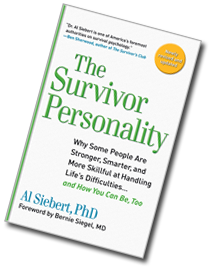My Seizure Disorder Has Made Me Stronger
by Camille Pierce
THRIVEnet Story of the Month - August 1999
People with epilepsy are always challenged to see positive aspects of their medical and neuropsychological disability. Having emotional resiliency in the face of seizure disorders can increase self-confidence and enhance one's attitudes, both about one's self and society.
I'm a 50 year old divorcee with no surviving immediate family members. I had febrile seizures at 6 months and intractable epilepsy at 12. I've taken anti-convulsants much of my life. For many years I hesitated nurturing my inner well-being. My emotional insecurity from being treated like a handicapped person by my family made my neurological challenges even more difficult. Like many people with physical difficulties, emotional stress, pain and suffering can become additional psychological burdens.
My condition does not allow me to handle the pressures and strains of a full-time job. I appreciate the Social Security Disability Insurance support I receive because it allows me to live by myself in a small apartment--a living condition I need because of my hyper-sensitive condition. My payback is to be of as much service as I can be to my community and to others. I've done lots of volunteer work for my church, for the American Red Cross(1), and at Holistic Healing conferences. I've been asked to be the Self Help & Psychology Magazine Internet Librarian in which I do a lot of Internet research, and add a variety of short quotes to their newsletters. I am active in the NetPsy and Telehealth discussion forums.
A few years ago, at the onset of early menopause, I was hospitalized for life-threatening seizures. Extensive neurological testing showed that my seizures could not be controlled with medications. I had only one choice. If I was to live, I had to have left temporal lobectomy surgery. Was I scared? You betcha! But coping with all the physical and emotional stresses led me to becoming more optimistic, developing a more independent attitude, and developing a much stronger inner self than if I had not had to deal with the effects of people who stare.
Staring is a good example of how "stigma" can harm a person. When you are a slender, sensitive person, it isn't easy to deal with people who stare at you or speak to you like you are a brain-damaged, retarded child. I've found that people hesitate to discuss stigma and epilepsy. I'm learning that the psychological effects of social/personal stigmas is a MAJOR problem for people with invisible disabilities.
I had my annual neurological workup at Stanford in March. I've been told to continue on the same medicine. I have short term memory lapses which I find frustrating. And, my left foot often twitches. To my knowledge, I haven't had an unconscious seizure for about 4 months!
I hope to help people of all ages, nationalities, race and creed understand that "stigma" is a BIG problem for people with seizure disorders and, in turn, can cause a multitude of psychological problems from depression to denial. But, we must learn to take responsibility for our general health and well-being.
I've taken many workshops and read many books about self-healing and have learned how to gain strength from adversity. I have a stronger inner self from daily meditation, exercise, a healthy diet, plenty of sleep, and laughter. There's a cartoon on my refrigerator which puts a much needed smile on my face. It shows a man stripped to his shorts, sitting on a stool in a medical examining room. He is smiling and has a white light emitting from his body. The doctor says to him, "You've been fooling around with alternative medicines, haven't you?"
Setting realistic goals has often been a challenge for me. It's not so much a lack of self-esteem as it is from having to cope with society's general belief that people with visible/invisible disabilities may not be qualified to perform certain tasks. I've experienced various types of discrimination more than once in my life. Even today, some people erroneously think that epilepsy is a mental illness! But my ability to handle prejudice and adversity indicates my successful emotional growth. I wouldn't have the inner strengths that I enjoy now if it hadn't been for my seizure disorder.
I've had e-mails and on-line discussions with people after my article about epilepsy was printed at the AtHealth.com web site(2). Once they understand that I'm not medically licensed they generally ask how I've been able to overcome tremendous obstacles, i.e. accepting that I have a seizure disorder, social stigmas, etc. I'm still amazed at the progress I'm making. I believe attitude has much to do with a positive sense of self. For me, this is emotionally challenging, yet rewarding.
--Camille Pierce
I'll be glad to answer any questions. My e-mail address is scholar@cruzio.com
(1) See Cam Pierce's THRIVEnet article Sept. 1997: "Disaster Work: Getting Stronger and Better" http://www.thrivenet.com/stories/stories97/stry9702.shtml
(2) A picture of Cam Pierce, her epilepsy article, and links to internet epilepsy resouces can be found at: http://www.athealth.com/Guest_PierceC.html
